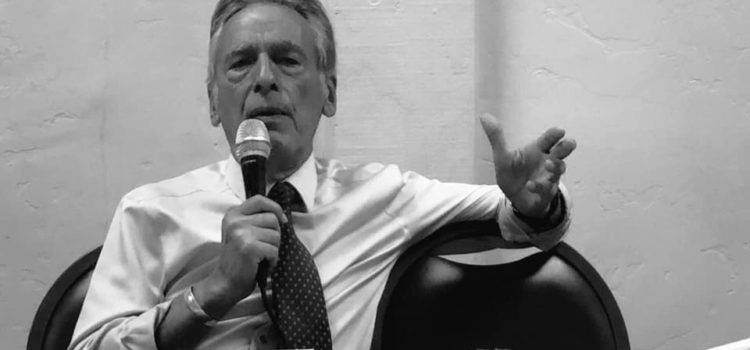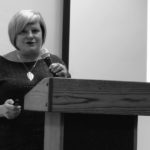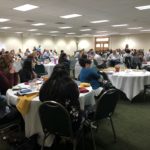
When an immigration officer conducts a warrantless arrest, it’s usually because the person has said too much or wasn’t aware of their rights. But what if every undocumented immigrant carried a letter addressed to themselves and signed by an attorney, instructing the person to remain quiet during questioning and instructing the officer to stop the questioning?
Could the letter protect undocumented immigrants from being arrested and detained? Peter Schey, the executive director of the Center for Human Rights and Constitutional Law, thinks so.
Schey shared his plans for his pilot project, called Cartas de Protection, Wednesday at the Greater Bakersfield Legal Assistance’s inaugural Civil Rights and Immigrant Communities Conference, where community members from local organizations, such as CAPK and United Way, filled Hodel’s Liberty Hall to hear about the current policies and issues immigrants in Kern County face.
Schey thinks a project like Cartas de Protection is necessary.
“It’s all based on racial profiling,” he said of Immigration and Customs Enforcement arrests. “It’s completely illegal. Officers are never going to question someone who looks European.”
Schey has been working on the project for a year and is almost ready to execute the project.
He has worked with 10 lawyers, who have agreed to each sign 1,000 letters, which will be distributed to people in Los Angeles. The service is free. All people have to do is sign up.
However, there are still some kinks to be figured out.
If the letter doesn’t protect undocumented immigrants, (which Schey is confident it will) Schey would like to have attorneys available to represent the immigrant out of custody, “but nothing more than that,” he said. He’s still working on this portion of the project.
Overall, Schey is confident this project can help immigrant communities.
“(Cartas de Protection) is one way to work as a community to decrease fear,” he said.
The audience expressed interest in the project, and a number of people asked Schey if he could help Kern County start a similar project. He said if the project is a success in LA, he would like to help start more projects in other cities.
“I think (Cartas de Protection) is a really good idea,” GBLA employee Valentin Narvaez said, with hopes to execute the project locally. “I hope we can help Peter with that idea.”

Gabrielle Lessard, the National Immigration Law Center Senior Policy Attorney, spoke about the new proposed Public Charge policy.
Photo courtesy of Reyna Olaguez
Gabrielle Lessard, the National Immigration Law Center Senior Policy Attorney, also spoke at the conference about the new proposed public charge policy, published in the Federal Register last week.
“The proposed rule is not as evil as the leaked version was,” she said, “But that’s the end of the good news.”
Although it’s “not as evil,” there are some radical changes, she said.
The Department of Homeland Security has changed the definition of public charge from someone who relies on the government for main source of support to someone who participates in a health, nutrition or housing benefit to support work.
In the proposal, the DHS is also considering more factors that make it harder for low-income and moderate-income people to pass the test. Immigrants fail the test if they are low-income, aren’t proficient in English or have a medical condition.
Lastly, the department is considering more benefits as a public charge, such as housing and non-emergency MediCal.
But it’s not too late, Lessard said.
“We can fight back against public charge,” she told the audience.
Last Wednesday initiated a 60-day period for the public to submit comments at regulations.gov/comment. DHS is required by law to review the comments and address them before issuing a final rule.

Community members fill Hodel’s Liberty Hall Wednesday for GBLA’s Civil Rights & Immigrant Communities Conference.
Other speakers included various immigrant community members, who spoke on topics including immigration removal proceedings and violence and Central American migration.
The conference is part of GBLA’s new Immigrant Human Rights project, according to Narvaez. There are plenty of outreach projects in bigger cities throughout California, but not many in Kern County, said Narvaez.
“I hope the community takes this information and spreads the information to others,” he said. “I hope the issues everyone faces together, not just immigrants, are better understood, and some of the misinformation that’s out there . . . was cleared up today at this conference.”